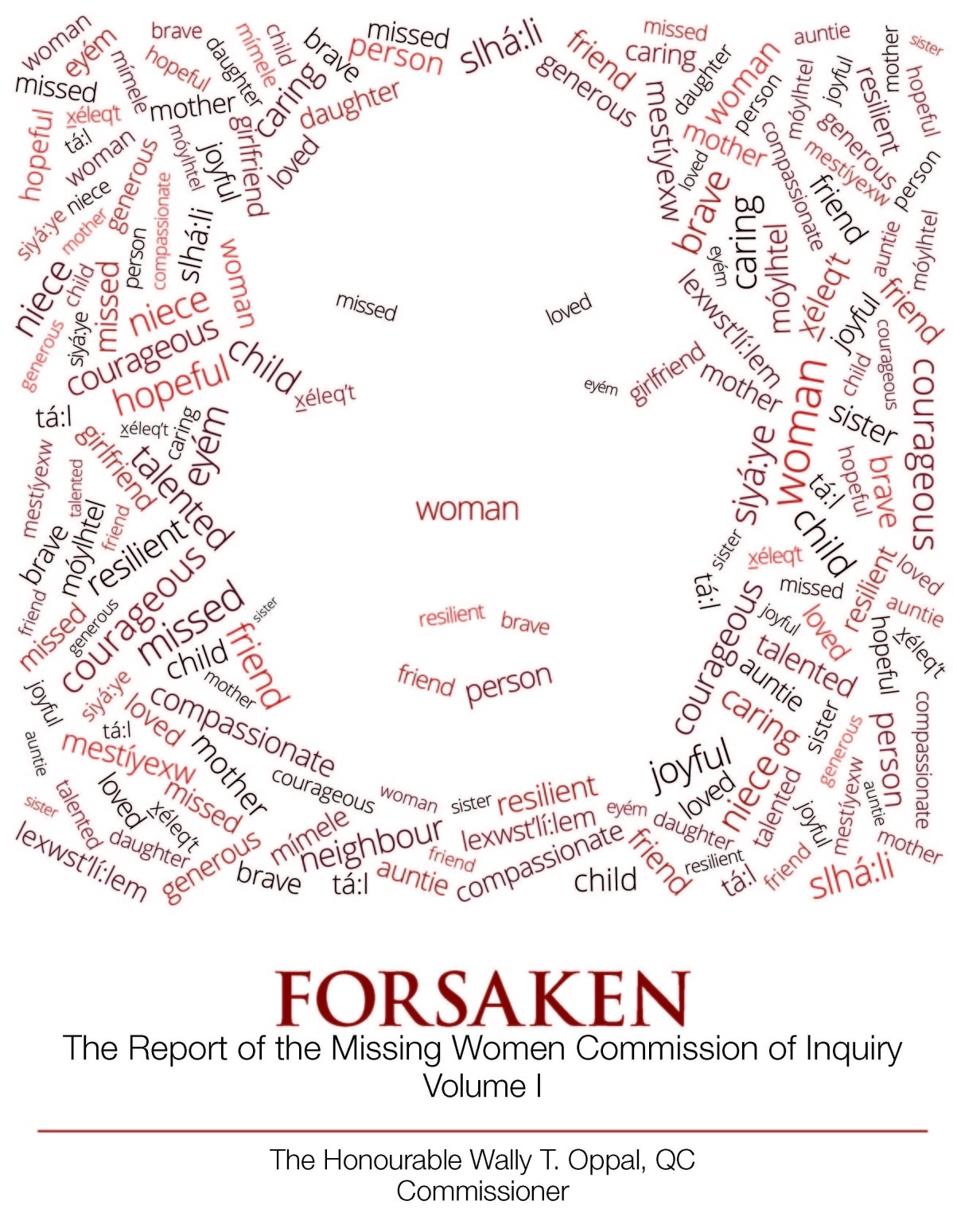Wally Oppal, the commissioner of the B.C. Missing Women Inquiry, called its final report “Forsaken”. In it, he claimed that the women who were murdered were doubly forsaken, once by society, then by the police. Family, advocacy groups and community members say this report will make the third time.
The Missing Women Commission of Inquiry was established in 2010 after years of rallies, marches, sit-ins, letter writing and sustained community and family pressure on British Columbia’s authorities, to find out what went wrong, and why women ‘disappeared’ from Vancouver’s Downtown Eastside.
With hindsight, we can see the truth. Robert William Pickton was picking up women from the low-income, marginalized community, taking them to his farm, then raping, torturing and killing them. Many people told the police their suspicions. In one case a woman was stabbed, got away and told the RCMP everything, but charges were stayed. Because the woman was a sex worker and substance user, the Crown thought she was a bad witness. Oppal’s report was to answer what went wrong.
At the beginning of the inquiry, 18 organizations were given standing to take part in the proceedings, but the provincial government refused funding for sex worker, Aboriginal, women’s and in some cases family members to participate. According to the” Blue Print for an Inquiry” report put out by B.C. Civil Liberties Association, West Coast Women’s Legal Education and Action Fund, and the Pivot Legal Society, police, RCMP officers and government officials had 25 lawyers.
Family and community members accused the inquiry of being one-sided; a pro-police exercise shielding institutions from any real accountability, especially for government and law enforcement. They argued that the tone of the inquiry was set by the appointment of Wally Oppal as Commissioner for the inquiry (a former B.C. Attorney General and judge, a colleague of then-government officials). They boycotted the process, protested being shut out of consultations and decision making. The mandate was set and the hearings took place without input from those that were most effected. The families and community groups say that justice for the marginalized women never had a chance.
Attorney Robyn Gervais, appointed to represent Aboriginal women’s interests quit the inquiry telling Global BC TV, “this inquiry was about missing and murdered Aboriginal women, I didn’t think I would have to fight to have their voices heard”. She then went on to say, “I feel like if I lend an aboriginal voice to this process it will give the public the perception that Aboriginal interests were adequately represented when in fact they were not”.
Oppal’s 1400+ page report is critical of police, to a point, but not of the institution of policing. Forsaken, points to multiple failures of the Crown, RCMP and Vancouver Police Department (VPD ) in terms of, lack of leadership, resources and communication, and the list goes on. He refers to “systemic bias” saying that, “The systemic bias operating in the missing women investigations was a manifestation of the broader patterns of systemic discrimination within Canadian society and was reinforced by the political and public indifference to the plight of marginalized female victims”. He also clarified that there was bias it was “unintentional”.
To translate, it’s not the fault of the police; they are a reflection of society’s indifference and dismissive attitudes towards marginalized women. There is some truth to his statement; society at large does have preconceived ideas about Aboriginal women stemming from Canada’s history of colonization and racism. They have sexist and judgemental ideas about women who are sex workers, or who use substances and are addicted. They are also aware of how these women are spoken about, or treated, by people in authority like the police, lawyers, and politicians.
Women who are sex workers, substance users, or have mental health concerns, or are criminalised; all have stereotypes that effect how society sees them and treat them that directly contributes to the violence they face, but it is argued that you’re not supposed to act, or fail to act, based on those stereotypes if you are a member of law enforcement.
Oppal’s response to suggestions that police should do better, “… it is heartless, unfair and wrong-headed to ask the police to do better without concurrently ensuring that we, as a society, do better”. The VPD have done work to address its failings. They held an internal review, publishing the results in 2010 and have completely redeveloped their Missing Persons Department, and now have a Sex Industry Liaison Officer. The VPD did issue an apology and stated they should have done better, sadly, other than a short statement the RCMP have been silent.
Community groups working with women in the Downtown Eastside released a statement after the press release in which read in part, “The Inquiry has been deeply and systemically flawed from the beginning. The voices and experiences of Downtown Eastside women, Aboriginal organizations and women’s groups were shut out. Family members’ needs and wishes have been, and continue to be, blatantly disregarded and disrespected, and the proceedings favoured police and police evidence. This failed Inquiry, far from assisting Aboriginal women and women from the Downtown Eastside, has ironically reinforced their marginalization”.
Oppal used “Forsaken” and “nobodies” in the report to explain how this could happen to somebody’s loved one. Family, community members, women’s organizations, indigenous groups, and social justice movements never called these women forsaken or nobodies. Did Wally Oppal not realize that it was society that called for action over ten years ago? That it was society that pressured government and police to investigate. Society repeatedly went to the police and city hall to say “help us!” and it was society that marched, rallied, wrote letters and demanded to know, where are our mothers, aunties, sisters and our children?
After spending $8 million on the inquiry, it seems the answer is that police screwed up, but it was society that was to blame. I’m sure the families feel better now.


